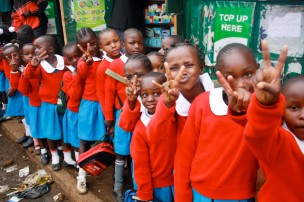
“Nobody saw me as this weird, white-girl alien coming from another universe,” said Simone Hyman ’15 about her experience in India this summer.
Hyman, who researched the stigmas surrounding mental illness in India with the MINDS [Mental Illness and Neurological Disorders] foundation, is one of several Wesleyan students who traveled abroad this summer to work for non-profit organizations. The MINDS foundation sent students to rural India in order to conduct research and volunteer at local hospitals, while SHOFCO organized a trip to Kibera, Kenya, where The Kibera School for Girls and clinic are based. The young activists interviewed by The Argus had only positive things to say about their abroad experiences and emphasized the transformative nature of international service work.
Although Hyman wasn’t, as she says, seen as an alien or an outsider by the patients she worked with, she noticed significant differences between rural Indian culture and her life at home. Throughout the process of interviewing patients, Hyman found that mental health treatment in India is not at all like it is in the United States.
“In India, they don’t really do psychotherapy,” she said. “There’s no confidentiality because the whole family is there all the time, but that’s the way they want it.”
Hyman conducted dozens of interviews with patients on their experiences with mental illness, and how it is perceived in their communities. She was often touched by their honesty and amazed by their stories.
“One patient said how he wishes people would understand that it is an illness and it’s not his fault,” she said. “He has no reason to feel ashamed. I think that’s very emblematic of what MINDS is trying to disseminate.”
Back at the University, Hyman intends to continue MINDS’s work of promoting universal mental healthcare.
“I plan on sharing the data so that MINDS can work it into their non-profit,” she said. “It’s important for people to see how getting treatment has changed their [MINDS patients’] self-esteem. I’m going to give the same three surveys that I gave in India here at the hospital where I work in order to do a cross-reference between stigma in a rural setting, with all the religious beliefs and ideations, and here in an urban setting.”
Setareh O’Brien ’14, who joined MINDS last winter, explained the process of preparing for the trip and the importance of respect and flexibility when volunteering in a different country. Compared to service work at home, volunteering abroad can have different challenges and rewards.
“It’s difficult to go abroad and apply what you learn here to a different cultural context,” she said. “It’s something we had to think a lot about to make sure we were aware of what was going on there and that we were attuned to it. It’s a critical experience. You have to be more flexible, and I think you end up learning a little bit more. It’s more trying, but because of that, it’s particularly valuable.”
Although she fundraised for MINDS at Wesleyan, the experience of traveling to India was especially eye-opening for O’Brien.
“It really drove home the value of what we [are] doing,” she said. “I think in some ways I always have my doubts with international organizations because I’m worried they’re not quite going to understand the people [whom] they’re working with. But it was really wonderful to see the change our work was making and the value of our services.”
The trip allowed O’Brien to connect with and better understand the people she’d been sponsoring.
“I got to see a way of life that I hadn’t expected to see in India,” O’Brien said. “You hear a lot about the very small, wealthy portion of the population and the really abjectly impoverished people, but there’s this whole village life that’s different from that dichotomy. The people aren’t necessarily miserable or starving, but they also have different standards of happiness.”
Maeve Russell ’14 traveled to Kibera, Kenya this summer to participate in SHOFCO’s summer institute. The institute continues the work that SHOFCO does over the school year.
“It [the summer program] helps a lot with raising awareness,” she said. “We can speak about the girls ourselves; we have pictures of the girls; we have their stories. We can really speak to [our goals] on a more individual level.”
A third-year member and SHOFCO’s liaison to the Office of Community Service, Russell was inspired and humbled by what she observed in the Kenyan slums over the summer.
“We were working with kids our age who had grown up in the slums,” she said. “They really have their lives together. They are doing amazing things, although some of them might not have had the best education. It’s cool to see kids our age that are so motivated.”
As someone who has participated in both local and international service work, Russell doesn’t see one as more important than the other.
“There’s need everywhere,” she said. “It’s impossible to say that there isn’t need in this community and there isn’t need in an international community. I don’t think that you can place one above the other.”
Russell finds SHOFCO to be particularly inspirational for its members because of the direct contact they have with the students in Kenya and the opportunity for personal connection.
“You meet the girls and you know how amazing they are,” she said. “You know that the second you walk into a classroom, all of their hands are raised. All of my pre-Ks want to be pilots and engineers, which is something you do not hear from six-year-old girls here.”


Leave a Reply